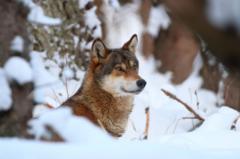In Romania's picturesque Carpathian mountains, shepherd József Rácz grapples with the challenging duality of raising livestock while confronting the threats posed by predators. Winter's first snow dusts Sansimion, a village where József and his sons maintain a flock of 500 ewes. The struggle is palpable, as wolves and bears regularly threaten his livelihood. Despite losing five to six sheep each year, József remains vigilant, relying on his 17 protective dogs—a "good dog," he asserts, is the shepherd’s best defense.
This week, a significant change looms over the European wolf population. A proposal from the European Commission seeks to downgrade grey wolves from Annex II—strictly protected status under the Bern Convention—to Annex III, which could pave the way for annual culling quotas set by individual EU countries. The Commission argues that with wolf numbers soaring from 11,000 in 2012 to over 20,000 today, livestock damage demands action.
Opponents, including wildlife advocates, argue that practical and humane solutions like enhanced shepherding methods and trained dogs should be employed instead of lifting protections. Proponents of wolf conservation highlight their ecological role in controlling deer and wild boar populations, which can lead to overgrazing and crop damage. Moreover, they emphasize that wolves contribute to limiting disease spread by preying on sick animals.
In Baile Tusnad, near József’s home, wildlife biologists convened and largely opposed lifting hunting bans. Michal Haring, a Slovakian biologist, reiterated the wolf's significance in managing diseases such as African swine fever by naturally regulating animal populations.
A recent EU report corroborates these advocates' claims, indicating that only about 50,000 of Europe’s 68 million sheep and goats are lost to wolves annually—representing merely 0.065% of the total. Notably, there have been no recorded fatal wolf attacks on humans in 40 years.
Advocates for wolf preservation, like Laurent Schley of Luxembourg’s Wildlife department, argue that wealthy European nations bear a responsibility to coexist with wolves, as they expect countries like India and Indonesia to protect their big cats. Although Luxembourg has yet to see any wolves, Schley predicts their arrival is inevitable, given the region's dense deer and boar populations.
However, József expresses deep concern over the increase in wolf numbers. He insists that these intelligent predators pose imminent threats to his livestock; a single pack can decimate a flock. After suffering the loss of his beloved dog, Moody, to wolves, József's fears intensify. For him, the growing wolf population increases the likelihood of losing his sheep—a sentiment that resonates amidst the complex interplay of ecology and agriculture in Europe.





















